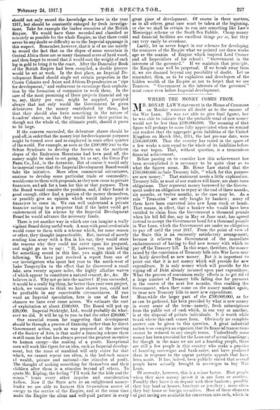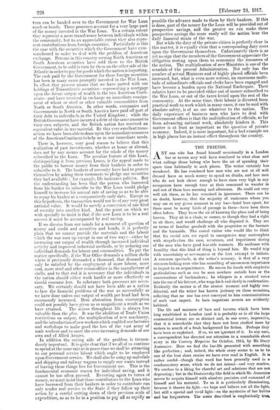WHERE THE MONEY COMES FROM.
BONAR LAITS statement in the House of Commons 1 on Monday removes all doubt as to the success of the War Loan. lie was not able to give final .figures, but he was able to indicate that the probable total of now money would not be less than 1700,000,000. The meaning of that figure will perhaps be more fully appreciated when we remind our readers that the aggregate gross liabilities of the United Kingdom on March 31st, 1914, the last pro-war date, were 1706,000,000. Thus the country has raised in the space of a few weeks a sum equal to the whole of its liabilities before the war began. That, without question, is a tremendous financial achievement.
Before passing on to consider how this achievement has been accomplished it is necessary to be quite clear as to what the figures mean. Mr. Bonar Law stated that the £700,000,000.include Treasury bills, " which for this purpose are new money." That statement needs a little explanation. Treasury bills, as most of our readers will know, are short-term obligations. They represent money borrowed by the Govern- ment under an obligation to repay at the end of three months, six months, or twelve months, as the case may be. As a rule " Treasuries " are only bought by bankers ' • many of them have been converted into new Loan stock or bonds. That means, in effect, that a banker who would have been entitled to claim from the Government a thousand pounds when his bill fell due, say in May or June next, has agreed instead to accept the Government bond for a thousand pounds in War Loan, which the Government are under no obligation to pay off until the year 1947. From the point of view of the State this is an eminently satisfactory arrangement, because it relieves the Government of the immediate embarrassment of having to find new money with which to pay off the Treasury bill. In this sense, therefore, the-money raised by the conversion of Treasury bills into War Loan may be fairly described as new money. But it is important to point out that it is not money which will provide for new expenditure. It is only money which will provide for the wiping off of Debt already incurred upon past expenditure. What the process of conversion really effects is to get rid of a large number of Treasury bills falling due for payment, in the course of the next few months, thus enabling the Government, when they come on the money market again, to issue new Treasury bills to meet new expenditure.
Mean while the larger part of the £700,000,000, as far as can be gathered, has been provided by what is new money in every sense of the term—namely, fresh subscriptions from the public out of cash which, in one way or another, is at the disposal of private individuals. It is worth while to ask where this cash comes from. Obviously no complete answer can be given to this question. A great industrial nation is so complex an organism that its financial transactions cannot be reduced to any simple terms. Undoubtedly some money has been provided for the Loan out of actual hoardings ; for though in the mass we are not a hoarding people, there are still a few people in this country who make a practice of hoarding sovereigns and bank-notes, and have produced them in response to the urgent patriotic appeals that have been made. It has, indeed, been publicly stated that several people have actually brought in sovereigns to buy War Loan.
Of necessity, however, this is a minor factor. Most people, when they save money invest it in one form or another. Possibly they leave it on deposit with their bankers ; possibly they buy land or houses, furniture or jewellery ; more often they buy home or foreign securities. Most of these elements of past saving are available for conversion into cash, which iu turn can be handed over to the Government for War Loan stock or bonds. These processes account for a very large part of the money invested in the War Loan. To a certain extent they represent a mere transference between individuals within the community, but to an appreciable extent they also repre- sent contributions from foreign countries. Particularly is this the case with the securities which the Government have com- mandeered in order to deal with the problem of American exchange. Persons in this country owning North American or South American securities have sold these to the British Government, to be sold in turn by them on the other side of the Atlantic in order to pay for goods which the nation is importing. The cash paid by the Government for these foreign securities has been in many cases promptly invested in the War Loan. In effect that process means that we have parted with our holdings of Transatlantic securities—representing a mortgage upon the future output of wealth in the two American Conti- nents—and have received in exchange an immediate consign- ment of wheat or steel or other valuable commodities from North or South America. In other words, companies and Governments in North or South America have paid off part of their debt to individusds in the United Kingdom ; while the British Government have incurred a debt of the same amount to their own subjects, and the British nation has received an equivalent value in war material. By this very excellent trans- action we have been able to draw upon the immediate resources of the American Continent to help us in our immediate needs.
There is, however, very good reason to believe that this realization of past investments, whether at home or abroad, does not by any means account for the whole of the money subscribed to the Loan. The peculiar feature of this Loan, distinguishing it from previous Loans, is the appeal made to the public to borrow money from their bankers in order to subscribe to it. The bankers of necessity have had to protect themselves by asking their customers to pledge any securities they had available ; for example, life insurance policies. But the understanding has been that the person who borrowed from his banker to subscribe to the War Loan would pledge himself to increase his normal rate of saving so as to be able to repay his banker at a comparatively early date. Except on this hypothesis, the transaction would not be of any very great national value. It would be merely a conversion of one kind of security into another kind. And the point on which we wish specially to insist is that if the new Loan is to be a real success it must be accompanied by real saving.
If we dismiss from our minds for a moment all question of money and credit and securities and bonds, it is perfectly plain that we cannot provide the materials and the labour which the war uses up except in one of two ways—either by increasing our output of wealth through increased individual activity and improved industrial methods, or by reducing our individual demands for labour and commodities. To put the matter specifically, if the War Office demands a million shells where it previously demanded a thousand, that demand can only be satisfied by the employment of more labour, more coal, more steel and other commodities in the manufacture of shells, and to that end it is necessary that the individuals in the nation should either work harder or more effectively or should consume less. In substance both processes are neces- sary. We certainly should not have been able as a nation to face the financial problems of the war as successfully as we have done unless our output of wealth per head had been enormously increased. Mere abstention from consumption could not possibly have given us so magnificent a result as we have attained. The minus throughout life is always less valuable than the plus. It was the abolition of Trade Union restrictions on output, the multiplication of new machinery, and the introduction of new workers which enabled our factories and workshops to make good the loss of the vast army of male workers and to meet the ever-increasing demands of our own and of Allied Armies.
In addition the saving side of the problem is tremen- dously important. It is quite clear that if we all of us continue to spend at the same rate as in peace time we shall be attracting to our personal service labour which ought to be employed upon Government service. We shall also be using up materials and shipping and railway wagons to supply our wants instead of leaving these things free for Government use. This is the fundamental economic reason for individual saving, and it cannot be too often pressed. Reverting again to terms of money, we must insist that those contributors to the Loan who have borrowed from their bankers in order to contribute can only render real service to the State if they follow up their action by a careful cutting down of their previous scale of expenditure, so as to be in a position to pay off as rapidly as possible the advance made to them by their bankers. If this is done, part of the money for the Loan will be provided out of prospective savings, and the greater we can make these prospective savings the more easily will the nation bear the daily financial strain of the war. But while the duty of the private citizen is perfectly clear in this matter, it is equally clear that a corresponding duty rests upon the Government themselves. Unfortunately there is as yet no sign that the members of the Government appreciate the obligation resting upon them to economize the resources of the nation. The multiplication of new Ministries is one of the scandals of the present Administration. Not only has the number of actual Ministers and of highly placed officials been increased, but, what is even more serious, an enormous multi- tude of subordinate officials and clerks have been engaged and have become a burden upon the National Exchequer. Their salaries have to be provided either out of money subscribed to the War Loan, or out of the taxes levied upon the rest of the community. At the same time, their labour is diverted from practical work to work which in many cases, it can be said with absolute safety, is of no use whatever to the nation. The daily experience of business men who have to deal with Government offices is that the multiplication of officials, so far from advancing national work, absolutely hinders it. This matter is at least as important as the question of private economy. Indeed, it is more important, for a bad example set in high places has an instant effect throughout the country.







































 Previous page
Previous page